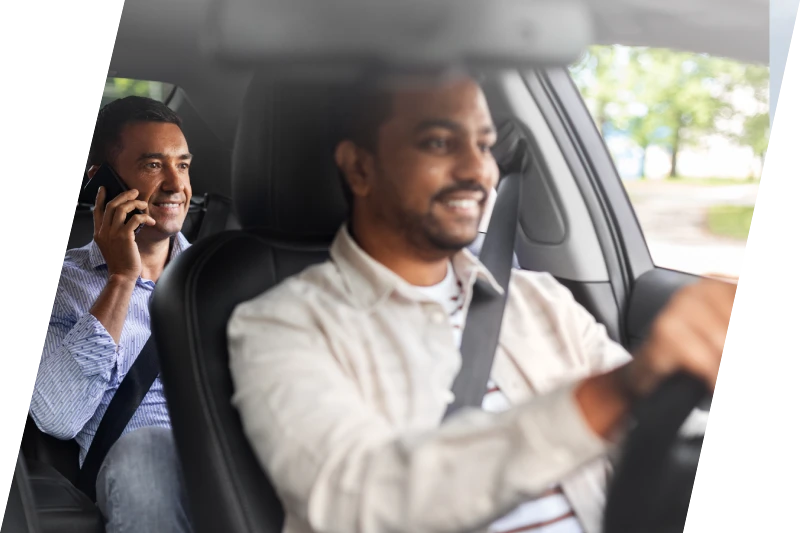
Last Updated: January 16, 2024
Contact US Drug Test Centers for expert assistance to comply with the mandatory controlled substance and alcohol testing program required by the California PUC Drug Testing. Drug testing locations are available throughout California and open daily.
The California Public Utilities Commission (PUC) has regulations requiring certain drivers to have drug and alcohol testing programs. These are drivers not regulated by the Department of Transportation (DOT) who must implement DOT-like drug and alcohol testing programs.
The PUC regulates businesses that obtain passenger stage corporation (PSC) certificates, in addition to charter-party carrier (TCPs) permits and certificates for companies transporting 15 or fewer passengers in California, and transportation network companies (TNCs).
PSCs are carriers such as door-to-door airport shuttle services. They provide transportation services to the general public on an individual-fare basis.
Let’s look further at TCPs and TNCs.
We have more than 20,000 testing centers across the nation. For assistance, call 866-566-0261 or order your test online!

Charter-party carriers (TCPs) are services where a vehicle is chartered for exclusive use by an individual or group. Also falling under the TCP category are round-trip sightseeing services and certain specialized services not offered to the general public, such as transportation incidental to another business and transportation under contract to a governmental agency, an industrial or business firm, or a private school.
TCP drivers operating vehicles with a seating capacity of 16 persons or more, including the driver, are covered by the federal Department of Transportation (DOT - FMCSA) drug testing rules.
The PUC requires that companies operating shuttle buses, party buses, tour buses, limousines, ferries, water taxis, and moving companies implement controlled substance and alcohol testing program. Traditional taxicab operators are regulated in California under separate laws and regulations.

The California Public Utilities Commission also regulates what it calls Transportation Network Companies (TNCs), like Uber and Lyft. As of 2016, there is a myriad of controversy and debate over the extent of the regulatory authority and the regulations that the PUC can require of these ride-sharing companies. Currently, TNCs must institute a policy of zero tolerance for intoxicating substances with respect to drivers in accordance with Decision 13-09-045.
Each TNC is required to include on its website, mobile application, and riders’ receipts notice and information on the TNC’s zero-tolerance policy and the methods for reporting a driver whom the rider reasonably suspects was under the influence of drugs or alcohol during the course of the ride. Also, the TNC’s website and mobile application must include a phone number or in-app call function and email address to contact to report the zero-tolerance complaint. Promptly after a zero-tolerance complaint is filed, the TNC is required to suspend the driver pending further investigation. Currently, Transportation Network Companies like Uber and Lyft are not specifically required to have drug testing.
For those transportation companies required to have drug testing (PSCs and TCPs), the PUC mandatory controlled substance and alcohol testing program includes requirements for:
For companies with just one driver, you must enroll that driver in a random testing pool — a consortium — that is managed by an independent company/consultant (third-party administrator TPA) and provide a copy of the contract or agreement for the random testing service.
As the owner of a charter-party carrier service, if you will also drive one of the vehicles to be operated under the charter-party authority, you are required to prepare a copy of your controlled substance and alcohol test results to be sent directly to the California Public Utilities Commission.
Ready to take the next step? For assistance, call 866-566-0261 or order your test online!
US Drug Test Centers can help PUC-regulated transportation companies with the mandatory controlled substance and alcohol testing program. Programs offered by US Drug Test Centers substantially comply with the California Public Utilities Commission’s alcohol and controlled substance testing program requirements, including General Orders 157 & 158, Resolutions TL-18716 and TL-18760, and Parts 40 & 382 of Title 49 CFR.
US Drug Test Centers will implement the required components of the mandatory program:
The PUC mandatory controlled substance and alcohol testing program is very similar to the DOT FMCSA program and requirements. However, it’s not under Federal authority, and DOT testing should not be performed. The PUC provides a Certification Form to verify compliance, and US Drug Test Centers will provide assistance in completing this form.
The California Public Utilities Commission (CPUC) requires certain drivers in the state of California to adhere to a drug and alcohol testing program, similar to that of DOT drug and alcohol testing programs such as for the Federal Motor Carrier Safety Administration (FMCSA). Pre-employment, random and post-accident testing will be included in all CPUC required drug and alcohol testing programs. In addition to drug and alcohol testing, CPUC businesses may also be required to complete reasonable suspicion supervisor training, exercise and maintain employee educational materials, and obtain a drug-free workplace policy manual if they are not a sole proprietor operating business and employ multiple qualified drivers. US Drug Test Centers is an approved third-party administrator (TPA) for CPUC and is authorized to perform drug and alcohol testing services for CPUC businesses and operators. Think you might fall under CPUC regulations? Call US Drug Test Centers today at (866) 566-0261 to get registered!
To help ensure you are in compliance with the California Public Utilities Commission (CPUC) drug testing program, your first and most important step is to l ocate and register with an approved CPUC third-party administrator (TPA) like US Drug Test Centers who can manage your drug and alcohol testing program from start to finish.
US Drug Test Centers will implement all required components of the CPUC testing program such as:
Think you might fall under CPUC regulations? Call US Drug Test Centers today at (866) 566-0261 to get registered!
The California PUC Drug Testing program covers all passenger stage and charter-party applicants who propose to employ drivers who will operate vehicles having a seating capacity of 15 persons or less, including the driver. These companies must comply with the Commission's controlled substance and alcohol testing certification program requirements detailed below. US Drug Test Centers is one of the only companies that offer a specific California PUC random drug & alcohol program to ensure drivers are in compliance. To get signed up today, give us a call at 866-566-0261 or you can sign up and enroll on our website 24/7.